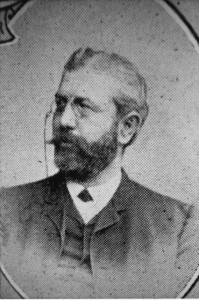Siegman Bergel
Values Codes I – H – E – L
“Not every Jewish person who came to pioneer California remained in the state. Most of those who returned to the East or Europe left little behind to mark their years in the Golden West. An interesting exception was Siegmund Bergel. His leadership in the community where he lived for the four years he spent in California was so fruitful and effective, that one could easily predict he would make his mark anywhere, which is exactly what happened.”
— Norton B. Stern
Siegmund Bergel was born in Prussian-occupied Poland in 1844.
Along the way . . .
At the age of 22 in 1866, Bergel came to America and established a private Jewish day school in Savannah, Georgia.
Two years later, he came to San Francisco, apparently realizing there were better opportunities to be found in California.
San Bernardino
In the 1860’s, leaders of the Jewish community of San Bernardino were appalled with the miserable quality of public school education in their locale, and decided to establish their own Jewish day school.
At the time, San Bernardino Jewry constituted a strong community with fine leadership.
One of the men, Jacob Rich, had served as president of Sherith Israel of San Francisco in the 1850’s, prior to relocating to Southern California.
Another man, Mark I. Jacobs, later became vice-president of Ohabai Shalome of San Francisco.
Late in April 1868, a delegation of San Bernardino Jews made a trip to San Francisco to find a teacher for what would become the San Bernardino Hebrew and English Academy.
They engaged 24-year-old Siegmund Bergel, who accepted and promptly set up and operated the first Jewish day school in Southern California.
The opening ceremonies of the school were held a month later, in connection with Shavout, the festival that celebrates the giving of the Torah.
The school met in quarters which formerly housed a church.
From the very beginning, the San Bernardino Hebrew and English Academy was a grand success.
That fall, a public examination of the pupils was held, and the non-Jewish editor of a local paper was deeply impressed with the youngsters’ recitations.
Community
Sigmund Bergel also conducted High Holy Day services for the Jewish Community in rented locations.
He continued to lead Jewish religious observances for the next four years.
Each year, the Academy’s theatrical performances in celebration on Purim attracted the entire Jewish community. Halls were rented to accommodate the attendees, and non-Jews were invited for a modest admission fee.
Such public events continued to impress local reporters, who lavished praise on the students, their teacher, and the school.
Fraternal
Siegmund Bergel became active in the leadership of Turnverein, a German-American athletic club.
He was an active member of the Masonic Lodge, and was involved in raising funds for the war relief (Franco-Prussian War).
Bergel was also a member and officer of the Odd Fellows.
When the San Bernardino Literary Society was founded in 1870, Bergel was elected president.
Europe
Bergel was a conspicuous and effective leader in many aspects of San Bernardino civic and Jewish life.
His work had altered the state of public education in the area simply by example.
He became an American citizen in 1871.
However, in April 1872, he announced he was leaving town for a visit to Europe. He never returned to California.
In Berlin, Bergel became a top Jewish communal leader.
Siegmund Bergel died in Europe in 1921.
It was noted in his obituaries that he was the most prominent B’nai B’rith leader in Europe.
He was called the “Grand Organizer,” founding B’nai B’rith lodges in the Balkan states, Turkey, Asia Minor, Copenhagen, and Basel.
Regrettably, his many obituaries overlooked his career as an educator in San Bernardino, Southern California.
Source
- Norton B. Stern, “Siegmund Bergel: Educator and “Grand Organizer, 1844-1921,” Western States Jewish History 41/4.

